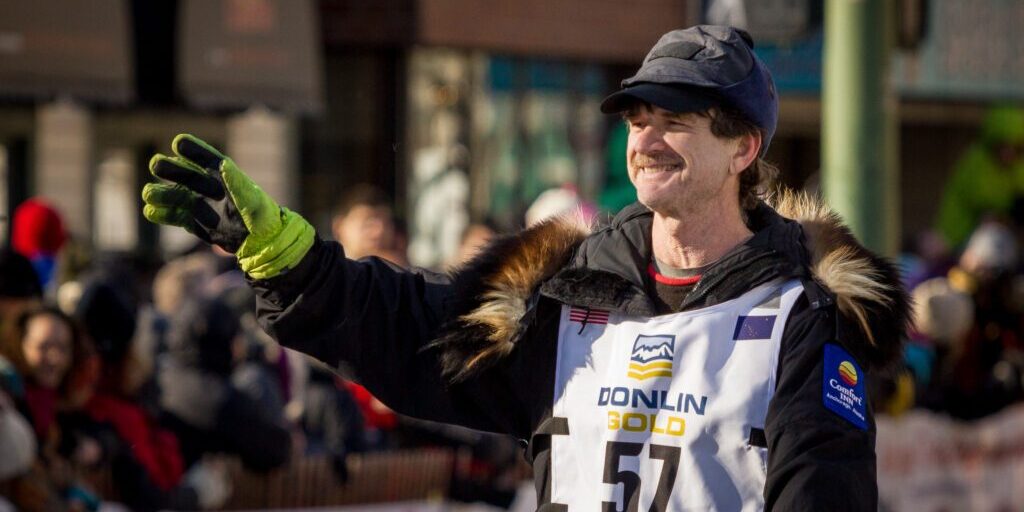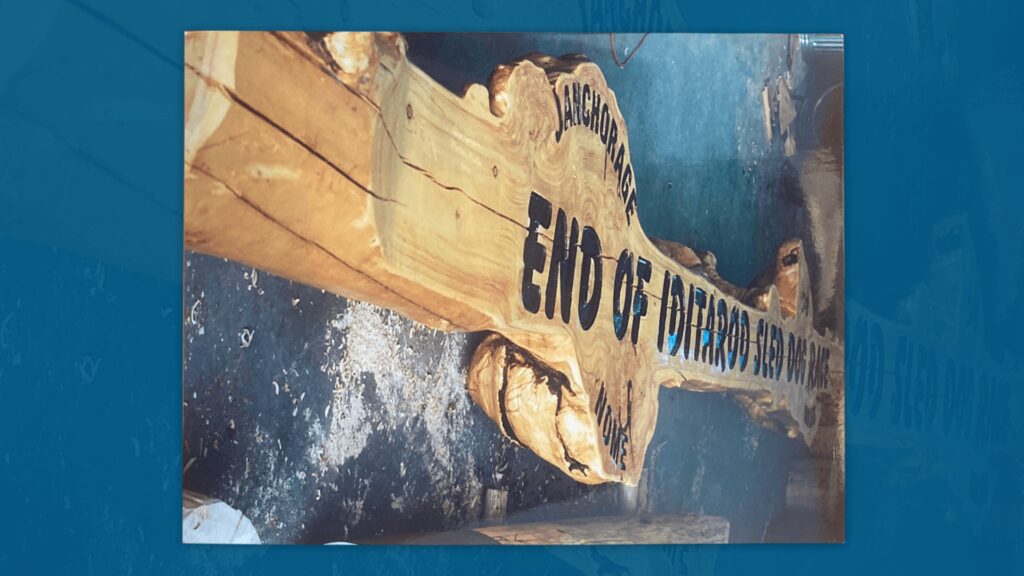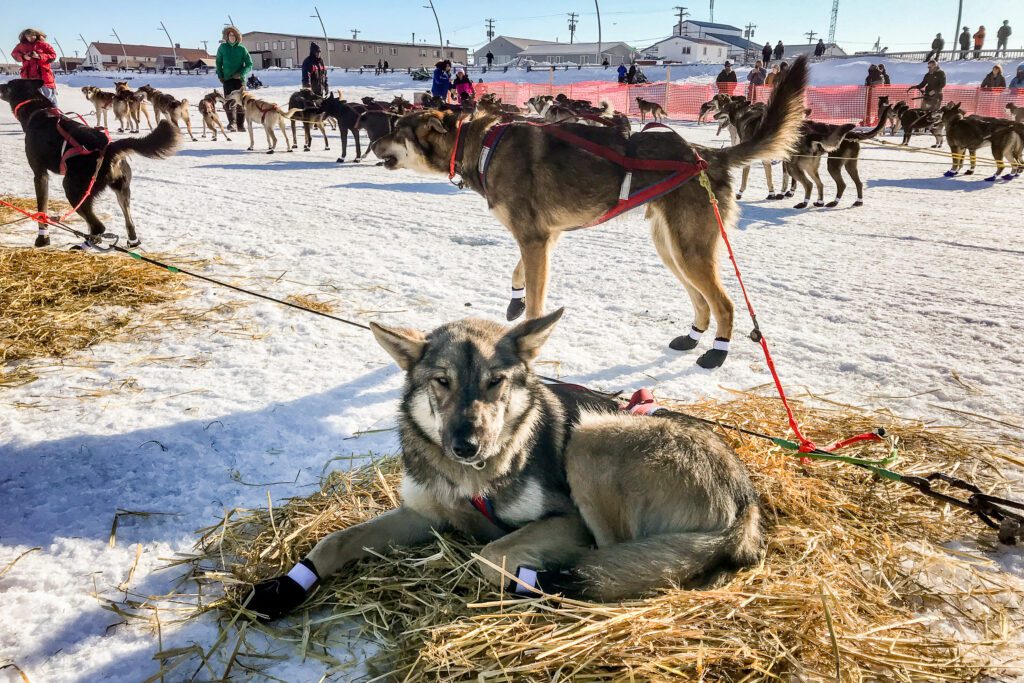The 2020 Yukon Quest started Saturday at 11am in Fairbanks. Though this is the smallest field in the race’s history, on paper it looks like a very competitive lineup. One musher competing this year is 3-time winner Allen Moore of Two Rivers, who holds the record for fastest finish time and is the oldest person to win the 1,000 mile sled dog race.
In this episode of KNOM Profiles, we’ll hear Moore discuss his preparations for this year’s race and his goal to capture that fourth Yukon Quest win at the age of 62.
Allen Moore: My name is Allen Moore, and what would be my title?
KNOM: Well do you introduce yourself as a three-time champion, a musher, or maybe a volunteer rider on the runners?
Moore: Well I guess I’m all of the above haha, but I don’t know what to introduce myself as.
KNOM: So what is your goal for the 2020 Yukon Quest?
Moore: It’s probably the same as every year, to win again. A couple years ago I won and became the oldest musher to win a 1,000 mile race, so I’d like to up that a little bit more.
KNOM: And you still hold the record for the fastest run time from Fairbanks to Whitehorse, or the fastest win time….
Moore: Yeah let’s try to beat that one too haha.
KNOM: Any particular strategy to try to achieve that?
Moore: Well the main strategy of course is to have a healthy dog team. Once you do that then it’s very possible that you can achieve a lot of those goals that we’re talking about. But without a healthy dog team, that’s not going to happen. So to start the race we are very conservative, like a lot of other teams will (be), because a thousand miles is a long way. If you can get through the first third or quarter of the race, then you’re good. The way I look at is you can really start racing then. But up until then you’re just trying to get them (the dogs) all trail hardened.
KNOM: And with the Quest too, you know this better than most, you have quite a few elevation gains and summits to go through. How does that factor into your strategy?
Moore: We like ’em (*chuckles). No but you never know about that either, there’s so many things out there that can get you and all the summits can especially if there are storms or this, that, and the other, and there normally are, at least on some of the summits. So you never know what’s going to happen when you get on a summit. It can change the race dramatically, in a moment’s notice, if you get a storm and you’re in the middle of it on top of one of those summits. We actually like going up the steep hills, we train for it quite a bit and it has paid off in the past. You just never know what you’re going to get. You always think you have a great dog team, or a good dog team, and you never know until you get into it. But we have mostly all the ones I had last year and the year before, a few new ones. Anything is possible and we could definitely do as well as we did two years ago, that’s what I’m hoping for. You can’t beat finishing with all of your dogs, with -50° below weather the whole race, and being 60-years-old when doing it. You can’t beat that! I want to be 62-years-old and do it now.
KNOM: Excellent. And you certainly have a knack for not dropping dogs. Do you have your final team selected at this point?
Moore: Absolutely I have them selected. We’ve just been not running very far this week, I mean I ran two hours on Tuesday, they’ll be running one hour Thursday and then they won’t run again until the race starts. Don’t want to do too much here this last week, get anyone injured.
KNOM: And most of your running you’re doing out at your kennel at Two Rivers or elsewhere?
Moore: Most of it at our kennel. But in the white mountains we go there often also because they have some good hills there. When it’s -40° below where we live, a lot of time it’s 20° warmer in the white mountains. So a lot of times we go there, which is only an hour and a half or an hour and fifteen minutes away from home.
KNOM: How have conditions been out on the trail?
Moore: The conditions, I think everywhere, have been near perfect. The trails are great, the river is frozen. Last week I went all the way up to Angel Creek, almost where the first checkpoint is (Two Rivers). And it’s all good. The only thing we have to worry about, maybe, is the cold weather again, but looks like we may have a reprieve from that after a couple days at the start. But we won’t worry about that, we’ll take it as it comes.
KNOM: Right. So logistically I’m assuming all of your food, drop bags and equipment are all set. Anything else to be worked out at this point?
Moore: Not much. Normally what most mushers do till the very end is they work on their sled doing this, that, and the other and then finally it gets time to race and we just quit working on them. I don’t know if it’s nervousness, or what it is, but it always seems like you’ve got to be doing something more to the sled than you’ve already done. And it never ends until we leave the kennel on Saturday morning.
KNOM: Give me your thoughts on some of the other mushers competing against you this year. There’s only 15 but it’s an interesting field of experienced veterans.
Moore: Yeah, well Brent (Sass) is always good. I mean we’re always vying back and forth with each other, sometimes it goes his way, sometimes it goes my way. Michelle Phillips she will be right there also. There’s a lot of good quality teams in it, even though the numbers are down. There have been races where I haven’t seen another musher in 700 miles, so it is a unique race. It’s not like an other race, you don’t see a lot of people or competition sometimes. You never know what’s going to happen this year, whether Brent (Sass) is going to go out, wide open, see how far out he can get quick. Or vice-versa like he did last year. You just never know till you get out there.
KNOM: So in those moments, like you mentioned stretches of hundreds of miles where you don’t see anybody else, or just in-between checkpoints in general, what do you do to stay focused with nothing else going on around you?
Moore: What I do, most of the time, 90% of the time is I’m ski-poling. Unless I’m going down hills, going faster than I want to go, then I’m always ski-poling. Number one that keeps me warm, it keeps me doing something, and then I’m always focused on what I”m going to do when I stop next time, whether it be for two hours, four hours, or longer. I’m trying to lay all that out before you get there, because the more efficient a musher is, then the more rest a person is going to get. And more rest helps tremendously in these long distance races when you don’t have a lot of rest. Two years ago I had three hours and 15 minutes of sleep in the first 500 miles. So every minute counts. I’m trying to look at what I’ve got at the next checkpoint, what I’ve got to get. I’m trying to get everything done in a tidy manner, as quickly as possible, because then I can get a little more rest, maybe five more minutes and that is huge when you don’t get much rest at all.
KNOM: Good point on the sleep deprivation there. And are you willing to say if you’re going to stop for your four-hours of rest at Mile 101 or at Central this year?
Moore: Well we have to stay at one or the other for four hours, and what I’ve done in the past, and what I will probably do, is stop at Mile 101 for four hours. Mushers get used to doing what they do and they don’t change that often, and I can’t see why I would want to change and go on to Central and take my four-hours there. So mostly likely I’ll do what I’ve done in the past, because it has worked for me fairly well. As the race goes on, we’ll let the dogs determine how long we’re going to stay and how far we’re going to go, even though we have a general race plan.
KNOM: I saw in an interview with KUAC that Dave Dalton expects this to be his last Yukon Quest, he might have 30 under his belt if he completes the race this year. Do you see the end of your Yukon Quest days anywhere in the near future?
Moore: You know people ask me that every year, they’ve asked me that for ten years. It could very easily be my last year, but I said that last year, and I said it five years ago. I am the same age as Dave Dalton, we’re both 62, so we’re not getting any younger. I just started late when I started, because I didn’t start racing thousand mile races until I was 50. So it could be (my last year). It’s like asking Tom Brady what is he going to do? We’re just focused on this race right now, and then when that’s over with we’ll let it set over the summer, and then that’s when we’ll make a decision whether I’m going to keep doing it or not. I really don’t have a good answer for that as of yet, I don’t even want to think about that really. We enjoy what we’re doing, do we want to keep doing it? Yep! I’ll let you know this summer (*chuckles).
KNOM: Alright sounds good. Anything you’d like to say to our listeners and people who might be following you on the trail?
Moore: I think Western Alaska is great. My daughter Bridgett and Scotty Watkins lived there for six or seven years, they worked there at the bank and the hospital. We would visit there (Nome) often. I think it’s a cool place, and I ran Iditarod 11 years, so I always finished there (in Nome) and it’s great. So we do have a lot of connections out there. We’ll be staying, when Iditarod comes, out there on Front Street, we have a house that we rented. I’m glad that Nome and the radio station have taken an interest in this race also. It can only help the sport of mushing. So way to go Nome!
Image at top: Musher Allen Moore. Photo from Matthew Smith, KNOM (2015).







